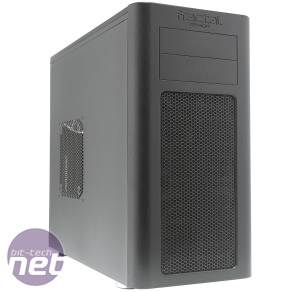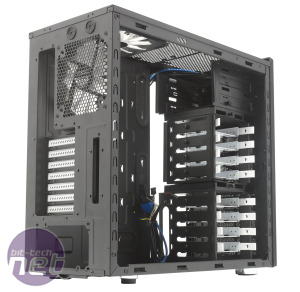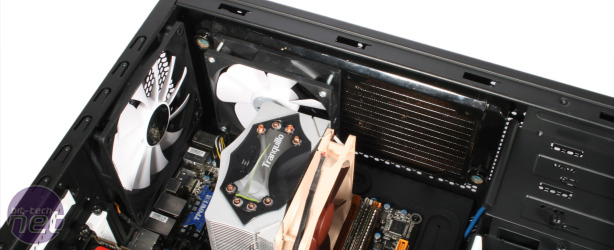
Fractal Design Arc Performance Analysis
Building a PC inside the Arc was a relatively painless experience, thanks to the copious amount of room behind the motherboard tray and the handily placed routeing holes. We had to leave the upper disk cage in its less thermally desirable perpendicular orientation, however, due to the length of our test graphics card.This didn’t seem to affect the Arc’s cooling, though, as after three hours of our strenuous thermal test the CPU hit a peak delta T of only 46oC. This is a great result, especially for a case that comes in at under £75, and it was only beaten by larger and more expensive cases such as the Lian Li PC-V1020, SilverStone FT02R-W and Antec Dark Fleet DF-85
This isn’t a massively surprising result, though, as the Arc has two large 140mm fans located very close to the location of the CPU cooler. This means that hot air coming off the cooler is removed very efficiently, which in turn helps to drag more cool air from the front of the case over the cooler.
The Delta T of our GPU was also impressive, clocking in at only 41oC. You may initially question why we think this result is impressive, as at first glance it looks relatively mid-table. A closer look at the cooling table, however, shows that 41oC is only a single degree behind costlier cases such as the SilverStone Raven RV02 and the Antec Twelve Hundred.
In fact, most of the cases that cooled our test graphics card more effectively than the Arc have either a dedicated side panel fan pointed at the graphics card, such as the In Win Ironclad or the NZXT Phantom, or are based on SilverStone’s inverted internal design, again meaning that a large, 180mm fan is pointed directly at the GPU.
One area where the Arc didn’t surprise, however, was noise. We were expecting the case to be louder than its Define stable mates and it was. The open fan grilles in the side panel and roof of the case allowed the noise of our graphics card cooler to leak out easily. Arguably, though, a degree of noise is just something you have to be prepared to put up with if you want a high-airflow case. At least the fans used throughout the case ran relatively quietly.
Conclusion
There's no doubting that the Arc is a competent case. It offers a good level of cooling for its price and size, and its myriad of spare fan mounts offer plenty of flexibility too. Our only reservation is that its muted style doesn’t do anything to make it stand out in what is a crowded market place.Nondescript looks worked fine for the Define R3, as it targeted a niche market of customers that wanted their PCs to be quiet and discreet, and it served that niche better than any other case. The Arc, however, has a broader appeal, which means it’s up against some substantial competition, much of which looks more interesting or exciting than the Arc.
The fact remains, though, that for £75 the Arc is a great place to stash your hardware; you just won’t get the fancy styling, flashing lights or premium materials you may find on more expensive ATX cases.

-
Cooling25 / 30
-
Features17 / 20
-
Design25 / 30
-
Value19 / 20


MSI MPG Velox 100R Chassis Review
October 14 2021 | 15:04











Want to comment? Please log in.